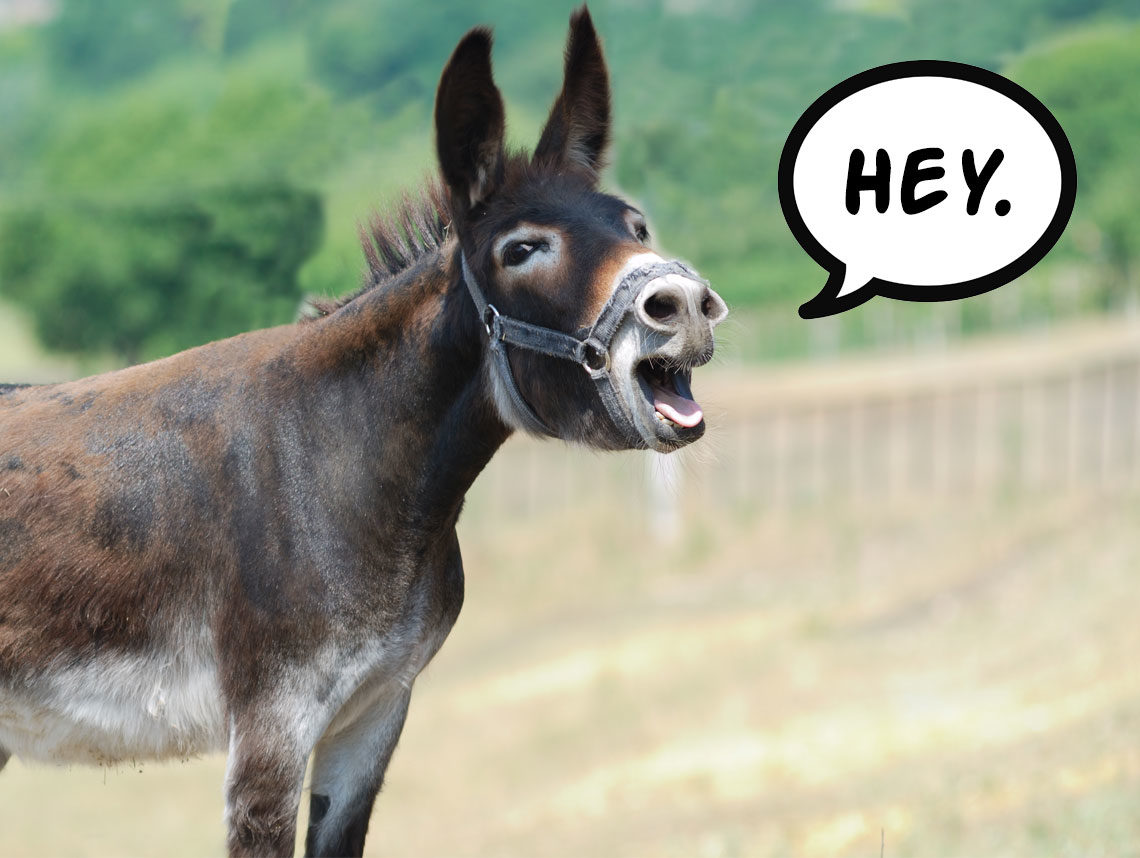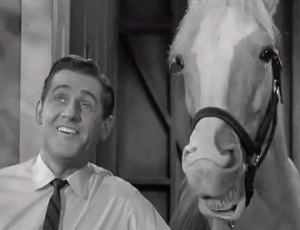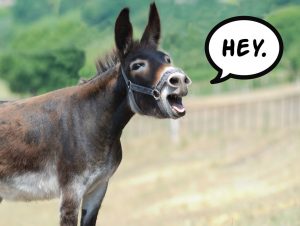 Raboyseyee and Ladies,
Raboyseyee and Ladies,
Talking Animals in the Toirah and TV
Last week we read of snakes and serpents; the Yiddin sinned, the snakes bit. Moishe, under direction of the RBSO, made a serpent and shoin, whomever was bitten was to stare at the image of the serpent, and just like that, he was healed. More midbar magic. This week, we will meet the talking ass or donkey. Is this the heylige Toirah? Is it Toirah-lite during the summer months? Is the Toirah on vacation? Is it but filling in the narrative with a few lighthearted storylines about sorcery and talking animals? Why does the Toirah taka feature a talking ass? Is this the first time the heylige Toirah featured a talking animal? Spoiler alert: it’s not! When before did we meet a talking animal? Sadly, mistama most of you no longer recall that talking animals date back kimat 6000 years. We’ll get to that soon.
Television, the movies, and other media have long been inspired by the heylige Toirah. Writers, who mistama went to yeshiva or day school, at least for a while, read the Toirah, read of snakes, serpents and donkeys, quail and more, and generations later, they gave us a talking horse known as Mr. Ed. He was followed by Wishbone the dog, and in more recent years, talking animal cartoon characters were featured in various movies and show including:
- 101 Dalmatians (1996)
- 102 Dalmatians (2000)
- The Adventures of Milo and Otis (1986)
- Aladdin (1992)
- Alice in Wonderland (1951) Alice in Wonderland (2010) …
- All Dogs Go to Heaven (1989) …
- Alpha and Omega (2010)
 Each came with their own personalities as unique as they would be if they were human characters. We won’t include Lassie or other dogs that just barked though mistama their owners understood them. The bottom line: Lassie didn’t talk, Mr. Ed did. How? It works azoy: to make the lips of animals seem to move in sync with actual speech, they use computer graphics to put a raster over the lips of the animal and shape them the same way human lips would look while speaking. The actual speech is spoken by voice-over actors and synchronized to make it appear the animal is speaking. It takes real effort to but simulate an animal speaking, ober not so for the RBSO who in this week’s parsha arranged for a donkey, an ass mamish, to engage in real back and forth conversation.
Each came with their own personalities as unique as they would be if they were human characters. We won’t include Lassie or other dogs that just barked though mistama their owners understood them. The bottom line: Lassie didn’t talk, Mr. Ed did. How? It works azoy: to make the lips of animals seem to move in sync with actual speech, they use computer graphics to put a raster over the lips of the animal and shape them the same way human lips would look while speaking. The actual speech is spoken by voice-over actors and synchronized to make it appear the animal is speaking. It takes real effort to but simulate an animal speaking, ober not so for the RBSO who in this week’s parsha arranged for a donkey, an ass mamish, to engage in real back and forth conversation.
Welcome to parshas Bolok which features the most fascinating story of Bolok, Bilham (Balaam), his donkey and several failed attempts to curse the Yiddin. Read all about it in the 95 (out of 104) pisukim of our parsha dedicated to this most amazing and at times bizarre storyline. And as you can only imagine, our sages went to town trying to decipher what the hec went down here. What is this Disneyish story doing in the Toirah? The Bilham story is in a number of ways so preposterous it makes the ten plagues and the splitting of the Yam Suf (Red Sea) look like child’s play.
Bikitzur (in short), Bilham, a goy mamish, a sorcerer, perhaps a diviner, and a prophet of sorts by profession, was commissioned by Bolok, King of Moiov to curse the Yiddin, and found himself incapable executing his assignment. Why so? The Bottom line: Because the RBSO dispatched one of His myriad malochim (angels) who got involved and in the end, despite several attempts to complete his mission, Bilham will -instead of cursing the Yiddin- bestow upon them four givaldige brochis (blessings), some of which we recite daily in our prayers. The last of his –perhaps unintended blessing- foretells of the Moshiach. OMG: Oscar worthy! Another bottom line: no one gets in the way of the RBSO!
Nu, to elongate this review, and so that you are entertained while learning some parsha, let’s quickly go over the Bolok/Bilham plot. In the morning Bilham arose, saddled his donkey and went with the Moabite dignitaries. The RBSO’s wrath flared because he was going, and an angel of the RBSO stationed himself on the road to thwart him, and he was riding on his donkey, and his two servants were with him. The donkey saw the angel of the RBSO stationed on the road with his sword drawn in his hand; so the donkey turned aside from the road and went into a field. Bilham beat the donkey to get it back onto the road. The angel of the RBSO stood in a path of the vineyards, with a fence on this side and a fence on that side. The donkey saw the angel of the RBSO and she was pressed against the wall. She pressed Bilham’s leg against the wall, and he beat her again. The angel of the RBSO continued going ahead, and he stood in a narrow place, where there was no room to turn right or left. The donkey saw the angel of the RBSO and it crouched down under Bilham. Bilham’s anger flared, and he beat the donkey with a stick. G-d opened the mouth of the donkey, and it said to Bilham, “What have I done to you that you have struck me these three times?”Bilham said to the donkey, “For you have humiliated me; if I had a sword in my hand, I would kill you right now.”The donkey said to Bilham, “Am I not your donkey on which you have ridden since you first started until now? Have I been accustomed to do this to you?” Bilham said, “No!”
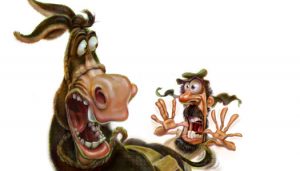 Mamish a back and forth conversation where seemingly the donkey chapped what Bilham was saying and was able to answer back in real time. Amazing! Ober where have we seen this before? Where else in the heylige Toirah was an animal of sorts empowered to engage in conversation? Nu, since you long forgot, let the Oisvorfer take you back to parsha Bereishis to Gan Eden (Garden of Eden) where the snake seduced Odom and Chava (Adam and Eve) to eat from the Eitz Ha’da’as (Tree of Knowledge) where we read azoy:
Mamish a back and forth conversation where seemingly the donkey chapped what Bilham was saying and was able to answer back in real time. Amazing! Ober where have we seen this before? Where else in the heylige Toirah was an animal of sorts empowered to engage in conversation? Nu, since you long forgot, let the Oisvorfer take you back to parsha Bereishis to Gan Eden (Garden of Eden) where the snake seduced Odom and Chava (Adam and Eve) to eat from the Eitz Ha’da’as (Tree of Knowledge) where we read azoy:
“Now the snake was cunning, more than all the beasts of the field that the Lord G-d had made, and it said to the woman, “Did G-d indeed say, ‘You shall not eat of any of the trees of the garden?’”
The woman said to the snake, “Of the fruit of the trees of the garden we may eat. But of the fruit of the tree that is in the midst of the garden, G-d said, ‘You shall not eat of it, and you shall not touch it, lest you die.’” The snake said to the woman, “You will surely not die. For G-d knows that on the day that you eat thereof, your eyes will be opened, and you will be like angels, knowing good and evil.”
 The snake, as he was then and so remains forever as that his seemingly his mission in life, if you chap, was a seducer. He targeted Chava, convincing her that G-d is jealous of anyone who has the power to create. By eating from the Tree of Knowledge, they, Odom and Chava would be able to create worlds, which is the real reason that the RBSO forbade them from eating its fruit. Nu: after Chava succumbed to the snake’s advances, she, using a woman’s own powers of persuasion, had little trouble convincing Odom to partake. The sages explain that the snake knew that it would not be successful in seducing Adam, only Eve could do that. But, on the other hand, only the snake was able to seduce Eve.
The snake, as he was then and so remains forever as that his seemingly his mission in life, if you chap, was a seducer. He targeted Chava, convincing her that G-d is jealous of anyone who has the power to create. By eating from the Tree of Knowledge, they, Odom and Chava would be able to create worlds, which is the real reason that the RBSO forbade them from eating its fruit. Nu: after Chava succumbed to the snake’s advances, she, using a woman’s own powers of persuasion, had little trouble convincing Odom to partake. The sages explain that the snake knew that it would not be successful in seducing Adam, only Eve could do that. But, on the other hand, only the snake was able to seduce Eve.
Ober why are we discussing Chava and snakes when the parsha features an ass? Weren’t we taught that the heylige Toirah is not a storybook, and that animals don’t talk? We were! Ober Bilham’s donkey, so says the medrish, was an exception (as was seemingly the snake) as it had a unique mission, one commissioned by the RBSO during the twilight of the sixth day of creation along with a host of other special-case items set aside for pivotal moments when the RBSO wanted to flex by pulling off some special magic.
Are the mysehs related? Perhaps: Both storylines entail curses. The outcome of the conversation between the snake and Chava resulted in a four-fold curse: on Odom, Chava, the snake, and the earth. The conversation between Bilham and his donkey in our parshah also occurs in context of a curse. But, the most important similarity is the structure of the dialogue between animal and man in both cases. In both cases, first the animal addresses the human, then the human responds to which the animal responds back.
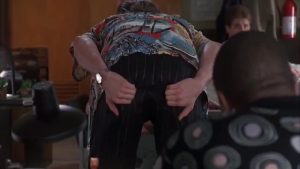 As an aside, the total words spoken by the snake came to 26 (9 words the first time and 17 the second). For practitioners of gematria (numerology) avada you know that 26 is also the numerical value of one of the RBSO’s names with the letters of Yud, kay, Vov, kay also equaling 26? Was the RBSO directing traffic at Gan-Eden’s Gate? Avada! Was the RBSO also the one talking to Bilham? Also avada; this time He chose an ass to do the talking. Veyter!
As an aside, the total words spoken by the snake came to 26 (9 words the first time and 17 the second). For practitioners of gematria (numerology) avada you know that 26 is also the numerical value of one of the RBSO’s names with the letters of Yud, kay, Vov, kay also equaling 26? Was the RBSO directing traffic at Gan-Eden’s Gate? Avada! Was the RBSO also the one talking to Bilham? Also avada; this time He chose an ass to do the talking. Veyter!
Says the medrish (Bamidbar Rabbah): the RBSO made the donkey speak to show Bilham that “the tongue and mouth (speech) are entirely in His hands,” to the extent that He could even make an animal speak. The RBSO wanted Bilham to realize that when it would come time for Bilham to curse the Jews, he would be entirely at G‑d’s mercy.
Ober so many questions arise: Ershtens, who was this Bolok character? Why did he want the Yiddin cursed, why was Bilham hired, what were his credentials, and why was Bolok afraid of the Yiddin? What role did the donkey play? Did the donkey mamish talk, and if so, was it also capable of understanding and conducting a two-way conversation? This story with the talking donkey is puzzling from beginning to end. If the RBSO didn’t want Bilham to go to Bolok, why didn’t He just stop him from going? If for whatever reason the RBSO wanted to block his way with an angel, why did He hide the fact from Bilham and allow the donkey to see the angel? Was the donkey the real prophet?
Why was the miracle of a talking donkey necessary? Had Bilham been allowed to see the RBSO’s angel, would the entire donkey miracle have been necessary? Why did the RBSO arrange the entire theatrical production of blocking Bilham’s ability to see the angel, resist moving on, until the donkey ends up speaking? Why the need to open the donkey’s mouth? Moreover, the contradictions in the narrative certainly spawned inconsistent characterizations of Bilham, through the ages. Our Sages of the Mishneh (Ovis 5:19) teach us that Bilham was evil -they called him “Bilham the Wicked.” Says the heylige Gemorah (Sanhedrin 105a): Bilham is named as one of only four prominent commoners who have no share in the world to come: he, and his followers, forfeited Oilom Habo!
On the other hand, says the medrish (Midrash Seder Eliyahu Rabbah): Bilham efsher had greater wisdom than even Moishe?! Ober how can we even utter these two names in the same breath? Was Bilham mamish as great as was Moishe? Let’s find out and to do so let’s quickly fast forward to the end of Devorim (Deuteronomy), the end of Moishe’s life where we read of the great mourning of the people at this immeasurable loss. Says the heylige Toirah (Deuteronomy 34:10: Never again did there arise in Israel a prophet like Moishe — whom the LORD singled out, face to face. וְלֹֽא־קָ֨ם נָבִ֥יאע֛וֹד בְּיִשְׂרָאֵ֖ל כְּמֹשֶׁ֑ה אֲשֶׁר֙ יְדָע֣וֹ ה’ פָּנִ֖יםאֶל־פָּנִֽים׃
Says the Sifrei (Devorim 357), azoy: while there was never a prophet like Moishe in Israel, there was in fact one among the nations:
And there shall not arise in Israel again a prophet such as Moishe”… But among the nations, there did arise. And who was he? Bilham the son of Beor. But there is a difference between the prophecy of Moishe and the prophecy of Bilham. Moishe did not know who was speaking to him, and Bilham did know. “The speech of the hearer (Bilham) of the words of the Almighty.” Moishe did not know when He would speak to him until He did so. Bilham did know, “and the knower of the knowledge of the Most High.” Moishe did not speak with Him unless he was standing, “And you, here, stand with Me.” And Bilham spoke with Him when he was fallen, viz. (Num. 24:4) “The vision of the Almighty shall he see, fallen and his eyes uncovered. Ober, if Bilham was such a bad guy, why is he compared to Moishe? Ver veyst!
So many excellent questions. And the answers? Ver veyst! Seemingly it was all part of the RBSO’s master plan and our sages, looking back at the events, try valiantly to make sense of the events.
Says the Mishne in Pirkei Ovis: (Ethics of our Fathers) azoy: the “donkey’s mouth” was one of the ten unique things created at dusk on the sixth day of creation. In other words, the RBSO planted this episode from the beginning of time by creating the “donkey’s mouth” for the day when the donkey would speak to Bilham in the year 2488. Why is the “donkey’s mouth” so significant? Nu, mistama the RBSO wanted us to learn a lesson from the ass’s mouth, efsher it’s our tafkid (mission) to figure out what He wanted us to take away from the gantze myseh (entire story). Ober what are the takeaways?
Nu, let’s start here with a few startling thoughts from the heylige Gemora, medrish and others; each provides some gishmake color. The topic represents low hanging fruit. Let’s chazir what took place, why not? Says the heylige Zoihar, he the great kabbalist, azoy: Bilham’s powers of sorcery came from his donkey. Mamish? Through his immoral acts with it, he would tap into powerful, impure energies, which he would use to harm people. Speaking of tapping and in plain English, says the Zoihar azoy: Bilham was tapping (shtupping) the donkey! OMG! And somehow, these acts of bestiality – a first in the heylige Toirah, or maybe not- and as a result, was able to perform magic of sorts. How does tapping the ass allow one to gain such powers? Nu, let’s not go there! Ober, where else have we come across bestiality in the Toirah? Nu, let’s recall a Rashi in parshas Noiach which tells us that Noiach’s generation was doomed to die in the mabul because they were mamish morally corrupt. Amongst their many sins, we can also include bestiality. Says Rashi (Bereishis 6:12, azoy: in Noiach’s time, “even the animals were cross-breeding.” Pshat being that it was already understood that man was engaged in immorality and also bestiality. Oy vey!
The RBSO avada had disdain for such backward, if you chap, behavior and taka outlawed bestiality as we read in parshas Achrei Mois (Vayikro 18:23) where the heylige Toirah told us azoy:
| 23. And with no animal shall you cohabit, to become defiled by it. And a woman shall not stand in front of an animal to cohabit with it; this is depravity. | כגוּבְכָל־בְּהֵמָ֛ה לֹֽא־תִתֵּ֥ן שְׁכָבְתְּךָ֖ לְטָמְאָה־בָ֑הּ וְאִשָּׁ֗ה לֹא־תַֽעֲמֹ֞ד לִפְנֵ֧י בְהֵמָ֛ה לְרִבְעָ֖הּ תֶּ֥בֶל הֽוּא: | |
Bilham was intimate with his donkey? What’s pshat? And he’s a featured character in the Toirah getting shout outs in at least three different parshas? Says the heylige Gemora (Avoido Zoro 4B see Rashi, Bamidbar 22:30): the dialogue between Bilham and his ass went as follows: The Moabite dignitaries asked Bilham, “Why do you not ride a horse?” Bilham responded that he sent his horse to graze. Immediately, the donkey retorted, “Am I not your donkey?” To which he responded, “Just for carrying burdens.” “On which you have ridden,” argued the donkey. “Only on occasion,” admitted Bilham. To which she responded, “Since you first started until now you have always ridden on me. Moreover, by day I provide you with riding and by night with intimacy.” Intimacy at night?! Oy vey!
And with that Gemorah fresh on our minds, we can also chap another teaching in the Zoihar (III:152a), which tells us azoy: Rebbe Shimon said: Woe to those who claim that the Toirah comes only to relate stories of this world in ordinary language. If this were so, even in our time, we could use ordinary language to write an even better Toirah! Or if you say the Toirah comes to teach affairs of this world, we already have ordinary books that do an even better job. All the words of Scripture conceal supernal truths and awesome secrets. You hear this? There’s more!
Come and see: The world above and the world below are parallel to one another: Israel below and the angels on high. Of the angels it is written (Psalm 104:4): “God makes God’s angels spirits.” But once they descend below, they are clothed in the ordinary garments of this world. Indeed, if this were not so, the angels would not be able to survive, nor would the world be able to endure their presence. And, if it is this way with angels, how much the more so for Scripture, which is the very blueprint for all Creation!
In plain English, he says azoy: certain stories in the heylige Toirah must be read, as merely an outer garment. And woe to one who imagines that the outer clothing is the actual scriptural teaching; he will have no portion in the world-to-come. As Dovid Hamelech (king David) said (Psalm 119:18), “Open my eyes so that I may behold the wonders of Your Toirah,” beneath the superficial garments. How are we to know which words are to be taken literally and which are but outer garments? Ver veyst! In other words: ver veyst if Bilham’s ass talked; perhaps it’s all allegorical, metaphorical and even apocryphal, and the story was included to teach us lessons. Let’s learn a few:
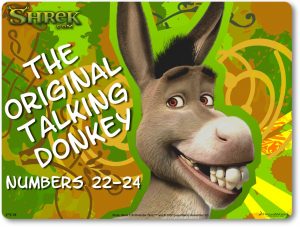 One of the mages we imagine as we read the parsha is that of the RBSO opening Bilham’s donkey’s mouth so that it could talk to him after Bilham had struck it three times. Bilham was on his way to curse the Yiddin on behalf of king Bolok. And pshat could be azoy: the Bilham story is a lesson in not to mess with the RBSO and His people. The entire episode is but a mockery of Bilham. The one perceived –by Bolok- to be able to control the Yiddin with words could not even control his donkey with a stick. The one who claimed to be a seer of the unseen could not even see what his donkey saw (the angel right in front of him)! The one who is the wise among the wise was beaten in a spoken exchange by the dumbest of animals. In the end, Bilham did not curse the Yiddin; only blessings spewed forth from his mouth. The entire Bilham donkey story comes to caricature Bilham and any other seer, for that matter, who, even with authentic access to the RBSO, sets out to do evil. Who better than a donkey to assist the RBSO in teaching Bilham this valuable lesson? Seemingly, even those with access to the truth can attempt to do harm; avada we must watch out for them.
One of the mages we imagine as we read the parsha is that of the RBSO opening Bilham’s donkey’s mouth so that it could talk to him after Bilham had struck it three times. Bilham was on his way to curse the Yiddin on behalf of king Bolok. And pshat could be azoy: the Bilham story is a lesson in not to mess with the RBSO and His people. The entire episode is but a mockery of Bilham. The one perceived –by Bolok- to be able to control the Yiddin with words could not even control his donkey with a stick. The one who claimed to be a seer of the unseen could not even see what his donkey saw (the angel right in front of him)! The one who is the wise among the wise was beaten in a spoken exchange by the dumbest of animals. In the end, Bilham did not curse the Yiddin; only blessings spewed forth from his mouth. The entire Bilham donkey story comes to caricature Bilham and any other seer, for that matter, who, even with authentic access to the RBSO, sets out to do evil. Who better than a donkey to assist the RBSO in teaching Bilham this valuable lesson? Seemingly, even those with access to the truth can attempt to do harm; avada we must watch out for them.
But did the talking donkey strike Bilham as odd? Bilham sought to use his power of speech to curse the RBSO’s Chosen People, ober the RBSO was the master of the power of speech! He could make a donkey speak and a man fall silent. Bilham, encased in his rage, noticed none of this. Did the ass really talk? Perhaps! It is certainly possible that the RBSO granted human powers to the donkey, it’s also perhaps permitted to think that the RBSO opened her mouth and spoke through her. The angel that barred his way is identified as the “Malach Hashem (angel of the Lord). After the donkey “spoke” to Bilham, and Bilham’s eyes were opened, the angel proceeded to ask the identical questions that came from the mouth of the donkey, further evidence that the RBSO and not the donkey, was actually speaking both times. The bottom line: Bilham was not entirely blind. Though he could not see the RBSO’s angel as it blocked his pathway while attempting to curse the Yiddin, he had good eyesight. He was, after viewing their expanse and seeing how they lived modestly (at least in this chapter), able to see perfectly and then bless the Yiddin instead. The RBSO works in mysterious ways.
A gittin Shabbis-
The Heylige Oisvorfer Ruv
Yitz Grossman
